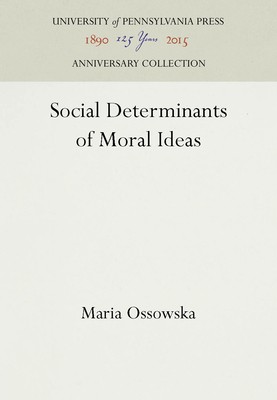
- We will send in 10–14 business days.
- Author: Maria Ossowska
- Publisher: University of Pennsylvania Press Anniversary Collection
- ISBN-10: 0812275985
- ISBN-13: 9780812275988
- Format: 14 x 21.6 x 1.3 cm, hardcover
- Language: English
- SAVE -10% with code: EXTRA
Reviews
Description
Moral facts are facts like any others, they consist of rules of action which can be recognized by some distinctive characteristics; thus it must be possible to observe them, to describe and classify them.--Emile Durkheim
A leading philosopher of the Warsaw school, Maria Ossowska here seeks to show that moral ideas can be examined with scientific rigor. She offers a sociology of morals that can be verified by observation and is philosophically based on the development of descriptive ethics. Ossowska goes on to examine how her approach to ethnical theory is related to the most important schools of moral philosophy, and considers how the model individual is related to social harmony.
A central chapter demonstrates that the moral values a culture assigns to ideas and events are variables depending on social factors: the value put on human for instance, may vary with the birthrate. Among the social influences investigated in this book are the physical environment, demography, and urban ways of life, degree of industrialization, and many other factors.
In the book's final section, Maria Ossowska addresses herself to a problem that is vexing in all ethical systems: how the ideal personality, the model individual, is related to social harmony. Among the ideal types of past societies, she singles out the Homeric warrior, the knight, the courtier, and the eighteenth-century bourgeois as case studies that illuminate different relations between society and the individual. Thoroughly at home in literature as well as in sociology and anthropology, Ossowska illustrates her approach with examples drawn from sources as familiar to English-speaking audiences as Benjamin Franklin and Robinson Crusoe.
EXTRA 10 % discount with code: EXTRA
The promotion ends in 16d.21:00:40
The discount code is valid when purchasing from 10 €. Discounts do not stack.
- Author: Maria Ossowska
- Publisher: University of Pennsylvania Press Anniversary Collection
- ISBN-10: 0812275985
- ISBN-13: 9780812275988
- Format: 14 x 21.6 x 1.3 cm, hardcover
- Language: English English
Moral facts are facts like any others, they consist of rules of action which can be recognized by some distinctive characteristics; thus it must be possible to observe them, to describe and classify them.--Emile Durkheim
A leading philosopher of the Warsaw school, Maria Ossowska here seeks to show that moral ideas can be examined with scientific rigor. She offers a sociology of morals that can be verified by observation and is philosophically based on the development of descriptive ethics. Ossowska goes on to examine how her approach to ethnical theory is related to the most important schools of moral philosophy, and considers how the model individual is related to social harmony.
A central chapter demonstrates that the moral values a culture assigns to ideas and events are variables depending on social factors: the value put on human for instance, may vary with the birthrate. Among the social influences investigated in this book are the physical environment, demography, and urban ways of life, degree of industrialization, and many other factors.
In the book's final section, Maria Ossowska addresses herself to a problem that is vexing in all ethical systems: how the ideal personality, the model individual, is related to social harmony. Among the ideal types of past societies, she singles out the Homeric warrior, the knight, the courtier, and the eighteenth-century bourgeois as case studies that illuminate different relations between society and the individual. Thoroughly at home in literature as well as in sociology and anthropology, Ossowska illustrates her approach with examples drawn from sources as familiar to English-speaking audiences as Benjamin Franklin and Robinson Crusoe.


Reviews